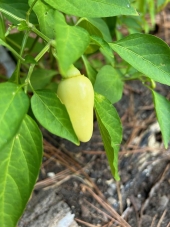
 25
25




 5
5




Ellendra Nauriel wrote:Questions? Concerns? Comments?
"Our ability to change the face of the earth increases at a faster rate than our ability to foresee the consequences of that change"
- L.Charles Birch
My Herbal Tea Store (CA)
 4
4











 10
10




Jarret Hynd wrote:
I'm not really interested in doing this myself as I have enough projects going on, but it was an interesting subject to read about and some questions arose:
1. What is the range of potential pay? It's quite a niche to have an isolated place that can produce "true" seed for these companies, so I'm wondering if we're talking about small amounts of money for people looking to get something out of their hobby, or if the pay has the potential to provide a part-time level of income. I know in some industries that rely on contracting, it's sort of a race to the bottom for pay between the company and producers. To put numbers into the picture: let's say I have 25 beds that are 10x4 in dimension (1000 square feet) - what kind of possibilities are there for income?
2.Can you give some basic requirements of what seed companies expect from their growers? I'm guessing that irrigation & triple mix soil would be mandatory for most veggie varieties?
3.Do companies ever look for wild varieties of plants for seed stock? You mentioned sage(the cooking variety I assume) in your write-up, and in my location I could sustainably harvest 10 pounds of sage seed (white or brush sage) in a half day from local pastures - both used in xeriscaping, ceremonies, etc. I have seen a lot of nurseries selling the wild varieties of dogwood, so I'm guessing that using seeds from wild plants is plausible.
 2
2




 4
4




r ranson wrote: I also looked into selling my own seeds and I discovered that there are some freaky-weird legislation and licencing requirements where I live.
 1
1




Julie Reed wrote:
r ranson wrote: I also looked into selling my own seeds and I discovered that there are some freaky-weird legislation and licencing requirements where I live.
This is something I’ve just learned recently; that many varieties of plants are patented. So you can’t just willy-nilly sell seeds or cuttings or sometimes even actual plants/trees if they are protected by someone else’s license. I find it simpler and equally profitable to buy seeds (or rooted cuttings), grow plants (trees), and sell them at swap meets at the local feed store. Perfectly legal!
"Our ability to change the face of the earth increases at a faster rate than our ability to foresee the consequences of that change"
- L.Charles Birch
My Herbal Tea Store (CA)
 1
1




 3
3




yet another victim of Obsessive Weeding Disorder

|
I don't like that guy. The tiny ad agrees with me.
permaculture bootcamp - gardening gardeners; grow the food you eat and build your own home
https://permies.com/wiki/bootcamp
|



